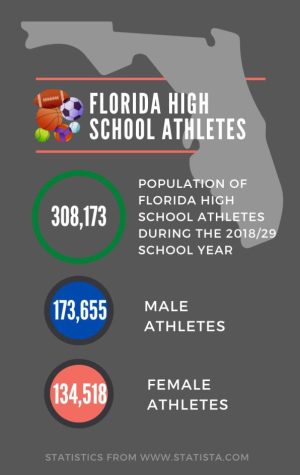Florida High-School Athletes Having to Disclose Menstrual History Questions Privacy
Making the menstrual history questions on physical forms mandatory is a clear invasion of privacy.
As the proverb states, “bad things always come in threes:” Florida is once again at risk of suffering the consequences of what would be an inadmissible decision, this time made by the Florida High School Athletic Association’s Sports Medicine Advisory Committee.
What started as “Don’t say Gay” became “Don’t say Black” and is now turning into “Don’t say Privacy.” A clear shot at investigating one’s reproductive health, high-school athletes in Fla. are at risk of having to disclose information about their menstrual history, conveniently closely after the recent Supreme Court decision of overturning Roe v. Wade.
Initially starting as a delusional idea once more born in Ron DeSantis’s Fla., the FHSAA is currently reviewing the idea of making the questions about menstrual history mandatory instead of optional. This would affect all female high school athletes in the state, as this inquiry will be placed on all Physical Evaluation Forms for participation in any school sports. An attack towards female rights, this decision will determine if athletes will be restricted in the future.
“My reaction to this draft is disappointment and disbelief because I find it very weird that we might be forced to share our own menstrual information just to be able to participate in sports. The system of physicals without this new rule has worked for years and years so I do not understand how this will improve the system at all,” sophomore Priscilla Scullin said.

The debate started by this proposal demonstrates how irrational it is, as backlash has been heard from both medical professionals and concerned parents. If medicine is not enough proof to illustrate the ridicule of such an idea even being considered, then what has happened to credibility and research over politics? A clear manipulation to spark controversy close to the imminent presidential election of 2024, DeSantis is clearly trying to use sports as part of his campaign.
Political campaign or not, this decision has some preoccupying privacy concerns attached to it. Disclosing this kind of information is an evident breach of privacy; no one should be obliged to answer such intrusive questions which do not have any medical purpose behind them, especially as minors. At a time where the procreative liberties of women in the United States are threatened, this private yet evidently politically influenced committee would be requesting details about an athlete’s menstrual history, questioning if there is a hidden purpose for this sudden interest.
“I think that there is an ulterior motive: wanting to limit reproductive rights. I know many people who have stopped using period calendar apps just because of the possibility of the government accessing such info. I think this is an invasion of privacy and it should be left to the athlete to decide whether or not to disclose their menstrual cycles,” junior Andrea Mase said.
An immediate effect of this decision would be the reluctance of female athletes to join sports. Already at a disadvantage in society due to stereotypes and physical body abilities, females are less likely to reach success than males due to reduced access to resources and training. Forcing the release of one’s menstrual history will lead to a drastic drop in female athletes participating in sports. Playing in a high school varsity sports team helps with earning scholarships and jumpstarts life as a professional, a great way for athletes to get into their dream college or receive an education without having to worry about finances.
“I think it’s discriminatory to ask female athletes to disclose their menstrual history on their physical. Not only can this lead to discrimination against trans athletes but it is deeply invasive. Menstrual histories are private and personal to the person they belong to. One does not necessarily want their coach or school to know their menstrual history for various reasons. Also, this installs a clear difference between genders that is unnecessary on many levels,” junior Daphne Renoux said.
Intending to block this draft from becoming reality, high school students and parents have asserted their disagreement with this measure. Now left in the hands of the FHSAA, this careless decision could impact the lives of female student athletes and bury the state into further gender injustices and lack of reproductive health access.
Your donation will support the student journalists of Coral Gables Senior High School. Your contribution will help us cover our annual website hosting costs.

Laura Ridoux is a senior in the International Baccalaureate program. This is her third year in CavsConnect and she is very excited to return as co-editor-in-chief...

Anthony Abrahantes is a senior in the International Baccalaureate program. Born in Miami, Anthony is the middle child in his family. This will be his third...









